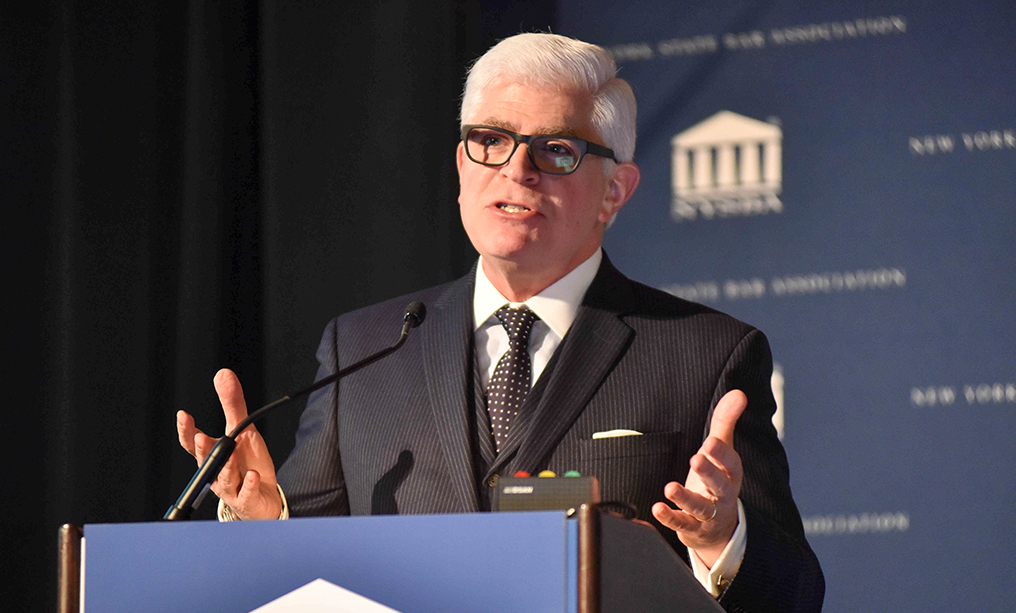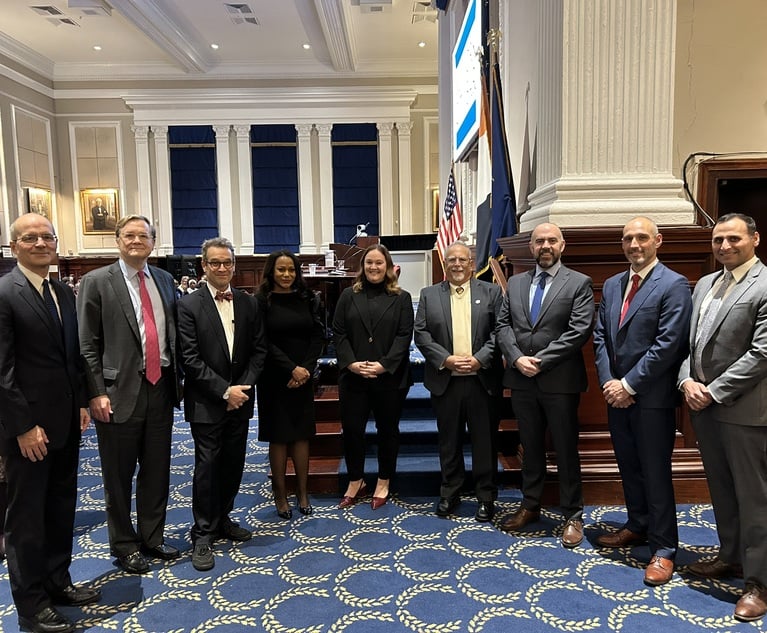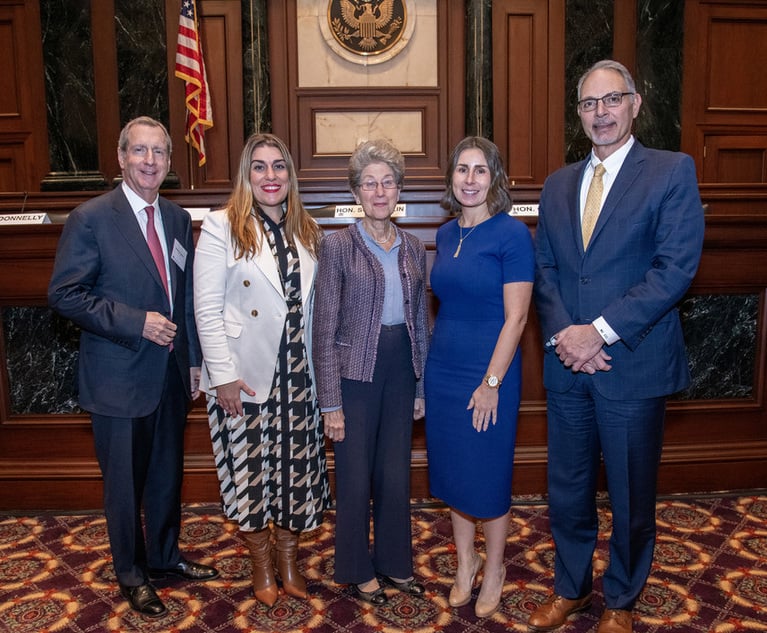New State Bar Association President Sees Tremendous Opportunity for Growth
"There are a lot of lawyer jokes, but when people are in trouble and need help, they don't call comedians – they call us."
May 31, 2018 at 12:47 PM
8 minute read

Michael Miller has been a solo practitioner in Manhattan for more than 30 years, with a general civil practice focusing primarily on estates and trusts. He is a past president of the New York County Lawyers Association, a past chair of the New York State Conference of Bar Leaders, and has been a member of the House of Delegates of both the New York State Bar Association and the American Bar Association. He received the ABA's 2002 Pro Bono Publico Award, its highest award for pro bono service, for his leading role in the post-9/11 legal relief effort. He takes over as the new president of the New York State Bar Association Friday.
Q: What has prepared you for the position?
A: Serving in leadership roles over the years at the New York State Bar Association (NYSBA) and the New York County Lawyers Association (NYCLA) has given me a keen perspective on and appreciation of the dynamics of bar associations and the justice system. I understand the challenges that our courts face and how bar associations can participate in meaningful efforts to improve the administration of justice, work to enhance access to justice for all and advocate for sufficient resources for the courts to meet their Constitutional duties. I have chaired committees and task forces and advocated on many important matters, including conditions in the courts, judicial evaluations, cameras in the courts, recording of judicial proceedings, recording of custodial interrogations and the dangerous impact of judicial budget cuts — as well as developing award-winning pro bono programs and hosting a TV program on legal topics for the general public. Perhaps the most important insight I have gained through my involvement at NYSBA and NYCLA is that all roads lead to membership. In order to be effective in recruiting and retaining new young members in our changing times, the number one job that bar leaders have is to provide a vibrant and relevant membership experience.
Q: With law firms cutting expenses, how will you demonstrate that membership in the State Bar Association is essential? How will you get members who are not active to take advantage of their membership?
A: It may seem counter-intuitive, but with many lawyers no longer viewing bar association membership as essential, I believe that there are tremendous opportunities for membership growth. Bar associations have been very slow to recognize and adapt to changes in our society generally, and to changes in our profession specifically. Attorneys no longer stay at one firm for their entire careers – indeed, it is common for attorneys to move from firm to firm. Additionally, more attorneys are opting to go solo or practice in a small firm setting, which provides a certain type of stability and less likelihood of conflicts. Indeed, more than 60 percent of NYSBA's members are solo or small firm practitioners.
Solos and small firms have always been cost-conscious by nature. NYSBA is focusing on providing meaningful membership value, devoting significant resources to provide the best comprehensive law practice management curriculum anywhere, and enhanced networking opportunities which are not available by merely using one's smartphone. And because we are in the age of the smartphone, we are developing more creative and interactive online content and unique opportunities for participation.
Q: What efforts will you make to increase membership, particularly among diverse lawyers, lawyers with unpopular political views and those employed by midsize and smaller firms?
A: NYSBA welcomes diversity of views and perspectives. Diversity takes many forms, especially for a state bar association in a state as diverse as New York. Our sections and committees have established diversity panels and we are supporting those efforts. NYSBA's Diversity and Inclusion Committee provides a diversity report card to our section leaders, to help them work to ensure that NYSBA better reflects the community at large, and has facilitated training for all NYSBA employees.
We know that large and midsize firm attorneys have been less inclined to participate in bar associations over the past several years. In some ways, it is easier to provide a meaningful membership experience for midsize and small firm lawyers, as they are more likely to need the practice management tools that we offer. So NYSBA is enhancing those offerings and providing opportunities through our committees and sections to provide a level of networking that is especially useful in today's world. We are also developing all sorts of creative online content and opportunities for participation.
As part of our comprehensive efforts to improve membership development in all areas, we will embark on a vigorous campaign focusing on providing a more meaningful membership experience for our out-of-state members, who represent a quarter of our current membership. We will develop chapters in U.S. cities that have large numbers of NYSBA members and offer new events and communications relevant to the out-of-state practitioner. We will also explore the possibility of establishing an out-of-state section for attorneys admitted to practice in New York who live and work elsewhere.
Q: What is your plan for attracting lawyers in specialized fields to the association?
A: Through its 25 substantive law sections and more than 50 active committees, NYSBA offers opportunities to hone one's professional skills and to interact professionally with leading attorneys from throughout our state. We are also recognized as an effective advocate for legislative change at both state and federal levels. I feel very strongly that local bars and affinity bars play an important role in our profession, but when there are unfair regulations proposed, inappropriate laws, violations of civil liberties or discriminatory practices, there is no stronger, more effective, more persuasive voice than that of the New York State Bar Association.
Q: What will be your priorities as Bar Association president? Name ways in which you want to take the Bar Association in new directions.
A: Our emphasis in the coming year will be on a broad range of topics relevant to the effective administration of justice in the 21st century including important criminal justice issues; the criteria and best practices for screening candidates for election to judicial office; and America's scourge of mass shootings, assault weapons and related legal issues. We will be a robust resource for law practice management matters and there will be greater emphasis on out-of-state members.
An important personal goal for me during my year as NYSBA president will be to remind people about the good things that lawyers do and the important role we play in peoples' lives. I attend a lot of bar association events throughout our state at which lawyers are honored for all sorts of important, selfless work. It is so inspiring to be reminded that we do so much more than just represent clients. We devote countless hours in pro bono efforts. We are problem solvers and we help people – sometimes during the most difficult moments in their lives. There are a lot of lawyer jokes, but when people are in trouble and need help, they don't call comedians – they call us. I will take every opportunity to remind my fellow lawyers, and the public as well, that we play a vital role in our communities.
NYSBA's headquarters, the State Bar Center in Albany, has been modernized with state-of-the-art audiovisual equipment and other improvements. We have developed a vigorous web-based presence and we are extremely active on social media platforms. I will continue to provide strong support for the work of our talented Executive Director, Pamela McDevitt, a former U.S. Army Captain and JAG Corps attorney, who returned to NYSBA after leading the American Bar Association's very successful law practice management department for several years. Pam came on board in February 2017 and has restructured the organization, promoted or hired key new department heads and brought an enhanced sense of purpose and discipline to the staff.
Q: In order to make room for new priorities, it's often necessary to decide what an organization no longer wants to do. What committees, task forces or events should the State Bar Association disband?
A: Over the past year, NYSBA's Committee on Committees has been evaluating the role of various committees and I expect we will make some changes based upon its recommendations. Additionally, as various task forces have submitted reports and completed their work, their work has been completed.
Q: At the end of your term, how will you judge if it has been a success?
A: I believe that success is not in the achievement but in the integrity of effort. I will devote my very best efforts to enhance NYSBA's brand, to advance the initiatives we undertake and to advocate energetically for NYSBA's legislative agenda. I will include NYSBA's president-elect, Hank Greenberg, in all leadership activities and executive decisions. It is my goal to help him be well-prepared to lead this association when he takes the helm a year from now.
This content has been archived. It is available through our partners, LexisNexis® and Bloomberg Law.
To view this content, please continue to their sites.
Not a Lexis Subscriber?
Subscribe Now
Not a Bloomberg Law Subscriber?
Subscribe Now
NOT FOR REPRINT
© 2025 ALM Global, LLC, All Rights Reserved. Request academic re-use from www.copyright.com. All other uses, submit a request to [email protected]. For more information visit Asset & Logo Licensing.
You Might Like
View All
Jimmy Carter’s 1974 Law Day Speech: A Call for Lawyers to Do the Public Good
14 minute read
City Bar Presents Thomas E. Dewey Awards to Outstanding NYC Prosecutors

Big Law Partner Presented With State Bar's Scheindlin Award
Trending Stories
- 1$5 Million Settlement Reached With Stone Academy
- 2$15K Family Vacation Turned 'Colossal Nightmare': Lawsuit Filed Against Vail Ski Resorts
- 3Prepare Your Entries! The California Legal Awards Have a New, February Deadline
- 4DOJ Files Antitrust Suit to Block Amex GBT's Acquisition of Competitor
- 5K&L Gates Sheds Space, but Will Stay in Flagship Pittsburgh Office After Lease Renewal
Who Got The Work
Michael G. Bongiorno, Andrew Scott Dulberg and Elizabeth E. Driscoll from Wilmer Cutler Pickering Hale and Dorr have stepped in to represent Symbotic Inc., an A.I.-enabled technology platform that focuses on increasing supply chain efficiency, and other defendants in a pending shareholder derivative lawsuit. The case, filed Oct. 2 in Massachusetts District Court by the Brown Law Firm on behalf of Stephen Austen, accuses certain officers and directors of misleading investors in regard to Symbotic's potential for margin growth by failing to disclose that the company was not equipped to timely deploy its systems or manage expenses through project delays. The case, assigned to U.S. District Judge Nathaniel M. Gorton, is 1:24-cv-12522, Austen v. Cohen et al.
Who Got The Work
Edmund Polubinski and Marie Killmond of Davis Polk & Wardwell have entered appearances for data platform software development company MongoDB and other defendants in a pending shareholder derivative lawsuit. The action, filed Oct. 7 in New York Southern District Court by the Brown Law Firm, accuses the company's directors and/or officers of falsely expressing confidence in the company’s restructuring of its sales incentive plan and downplaying the severity of decreases in its upfront commitments. The case is 1:24-cv-07594, Roy v. Ittycheria et al.
Who Got The Work
Amy O. Bruchs and Kurt F. Ellison of Michael Best & Friedrich have entered appearances for Epic Systems Corp. in a pending employment discrimination lawsuit. The suit was filed Sept. 7 in Wisconsin Western District Court by Levine Eisberner LLC and Siri & Glimstad on behalf of a project manager who claims that he was wrongfully terminated after applying for a religious exemption to the defendant's COVID-19 vaccine mandate. The case, assigned to U.S. Magistrate Judge Anita Marie Boor, is 3:24-cv-00630, Secker, Nathan v. Epic Systems Corporation.
Who Got The Work
David X. Sullivan, Thomas J. Finn and Gregory A. Hall from McCarter & English have entered appearances for Sunrun Installation Services in a pending civil rights lawsuit. The complaint was filed Sept. 4 in Connecticut District Court by attorney Robert M. Berke on behalf of former employee George Edward Steins, who was arrested and charged with employing an unregistered home improvement salesperson. The complaint alleges that had Sunrun informed the Connecticut Department of Consumer Protection that the plaintiff's employment had ended in 2017 and that he no longer held Sunrun's home improvement contractor license, he would not have been hit with charges, which were dismissed in May 2024. The case, assigned to U.S. District Judge Jeffrey A. Meyer, is 3:24-cv-01423, Steins v. Sunrun, Inc. et al.
Who Got The Work
Greenberg Traurig shareholder Joshua L. Raskin has entered an appearance for boohoo.com UK Ltd. in a pending patent infringement lawsuit. The suit, filed Sept. 3 in Texas Eastern District Court by Rozier Hardt McDonough on behalf of Alto Dynamics, asserts five patents related to an online shopping platform. The case, assigned to U.S. District Judge Rodney Gilstrap, is 2:24-cv-00719, Alto Dynamics, LLC v. boohoo.com UK Limited.
Featured Firms
Law Offices of Gary Martin Hays & Associates, P.C.
(470) 294-1674
Law Offices of Mark E. Salomone
(857) 444-6468
Smith & Hassler
(713) 739-1250







